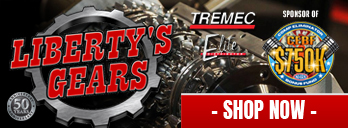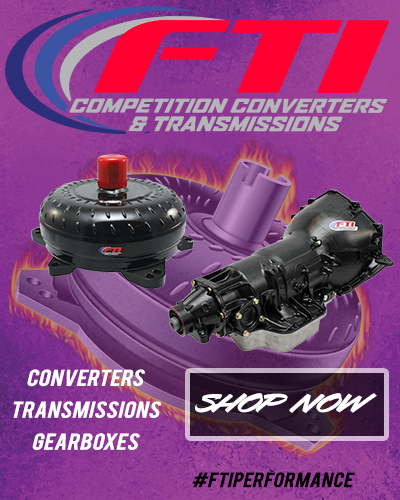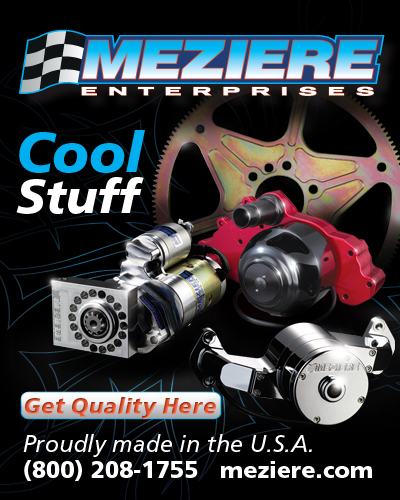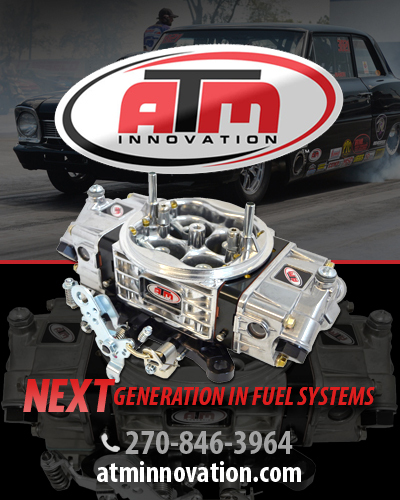CHASING A DREAM PAYS OFF FOR FORMER CREWMEMBER

"Rachel is a huge part of my success, "said Bell. "She underscores the expression that behind every successful man is a strong woman. Not only does she keep us all on track at home, but she also plays a big role in The BOSS.
"Rachel spent 10+ years in the corporate world of advertising and as The BOSS was starting to grow, I convinced her to join our company full time. I told her if she would put the effort that she puts in her job into The BOSS it will pay off and it has.
For every Robert Hight that exists, there's a Richard Bell.
Hight, the multi-time NHRA Funny Car champion, while working as a crewman for John Force dreamed one day he'd be a superstar Funny Car driver.
Richard Bell, on the other hand, dreamed one day he'd be a team owner.
Bell, who is much lesser known than Hight, got his start as a crewman working on a Pro Stock car owned by Pete Williams and driven by Rickie Smith back in the 1990s. Just like Hight, Bell aspired for greatness beyond grunt work.
This weekend Bell will serve as Smith's primary sponsor on his Pro Modified entry at the NHRA FallNationals hosted by the Texas Motorplex outside of Dallas.
Bell now owns The BOSS (Builders Outlet Super Store), a growing lumber-related retail business with three locations in the Dallas-Fort Worth area.
While Bell smiles at the notion he went from rags to riches, he isn't far off of the description.
"After high school, I wasn't smart enough to go to college, and in 1996, got a job working for Pro Stock racer Chuck Harris," Bell explained. "When he quit at the end of the season, I started working for Pete Williams. Rickie Smith was the driver and has always been my idol, but with Pete, that's how I got to meet Rickie. And then in '99, Rickie drove the car for Pete, didn't run a full year, but we won Houston that year in the car that Pete and George Howard owned and I was working on. I knew that I could either stick with the circus forever, but I'd never owned a race car by working on them."
Williams retired at the end of 1999, and that's when Bell went to work for him learning the pallet business. Shortly afterward, Bell moved from Alabama back home to Texas and started his own pallet business.
"I didn't know what I was doing and wound up having to cease operations," Bell admitted. "I went to work for a lumber supplier who I bought product from. About 12 years ago just made the decision to go out on my own. I started out just to be a wholesaler, but I kept on acquiring things and started selling it out of my garage."
Eventually, the dream grew bigger than what Bell's modest garage could handle.
"Whenever my wife and I had our first kid, she kicked me out of the garage and told me I need to take my business to the big time," Bell said. "So I rented a little shop 11 years ago, and that was where we officially started the first store."
Today, the modest Mom and Pop operation has expanded to three stores, with a fourth one on the way with 34 employees. With this said, when he worked for Williams servicing the car the doorslammer icon piloted, did he ever envision one day he'd reunite with Smith as a major sponsor?

"Those who know Rickie understand he's a bonafide nut to be 60-something years old, still driving," Bell said. "So if you would have told me 20 years ago I'd be in this position, I would have said, 'No, Rickie will be far retired by the time I'm in this position.' Even though the pallet business was a lesson in business, I did not give up on chasing that dream of wanting to own a race car."
Amid his fantasy of race car ownership, Bell's life got real busy with a wife, and three kids, all 11 years old and younger. He found an alternative to chasing his dream in sponsorship.
"It's a shame that Rickie doesn't have a full-time sponsor, but it sure is a cool deal that I was able to take advantage of the opportunity, especially with the races here in Texas," Bell said.
Smith started the season with Strutmasters.com, but when the company merged with another strut company, it changed the program's landscape, leaving him headed in a different direction.
Smith's passion soon became Bell's dream come true, thanks to the successful venture.
"I'm real proud of our website, shoptheboss.com," Bell said. "It's been an evolution. My second go-round in business, I just thought I was going to be a wholesaler, just booking loads and brokering stuff over the phone. With our first location, we just started finding little niches here and there. Our main niche is dealing with contractors or builders or real estate investors that aren't big enough to be on the radar of the big distributors and stuff, but they need more support and better pricing than the big box stores can get them.
"Everybody comes into my business now because I sell a lot of hardwood flooring, but a few years ago I started selling fencing, wood fencing. And people asked, 'Well, how in the world did you go from fencing to hardware?"

"When I used to be a lumber broker, I had all these connections. It's just one of those things, to where I was very fortunate to be around some really awesome people in the blue-collar, Pro Stock world. Pete Williams' daughters told me at his funeral that I was the son that he never had. And I was just fortunate to learn from Pete, you couldn't get more blue collar than him."
Bell also learned a lot from Smith, which he was able to translate into his business model.
"Even though Rickie doesn't have a bonafide business, his racing business, I have learned so much from him on preparation. I remember out there at Mooresville or Farmington, those Quick Eight races. We would go out there testing somewhere. We've made 12 runs when everybody else is making two or three. Just him trying stuff and analyzing it and that type of stuff. And then also the maintenance. I'll get a new piece of equipment or something. I say, 'Guys, take it out, let's try it out.'"
Bell became an admitted student of the game, but not in the sense of how to make a car work better. He learned how to make the funds to make a car happen.
"You had some of those guys out there, but the majority of the field was comprised of self-made millionaires that are spending $500,000 to $600,000 a year. Fortunately, I had the wherewithal to pay attention and kind of ask questions about their business. Ron Krisher has been a fantastic mentor. Jim Yates, the same way and Danny Coffman, just these guys that whenever I visit with them about business, it was like, "Hey, these aren't Harvard graduates, these are regular people that just busted their ass and built up a business. And that's what I want to be."
Smith finds it hard to put to words what Bell's support has meant to him throughout the next two races.
"It's keeping me alive right now," Smith admitted. "Richard had come up from nothing. He absolutely had nothing. And he's got a heck of a business now, and he took that trade up from hard work and drag racing to where he's at now. But I just really appreciate him coming on board and helping me get through these last couple races."
If there's anyone who knows the challenge of daring to dream, it's Smith, who made chased the pipe dream of Pro Stock in 1979 and achieving the status of doorslammer drag racing icon today.
"It's just pretty awesome of a guy that realizes how hard it is to make it out here in racing," Smith said. "It's just nice to have people like that in this business that'll help the racer and help us all keep going out here."
We get it. Some folks don't like wearing a mask, but if you must at least wear one that doesn't look like you work in a hospital. Here it is, the OFFICIAL mask of Gasser Racing. Very breathable and comfortable. Get yours today - CLICK HERE TO BUY - https://t.co/GLe5FMHXz7 pic.twitter.com/13vJDg6sbh
— Competition Plus (@competitionplus) September 20, 2020






































